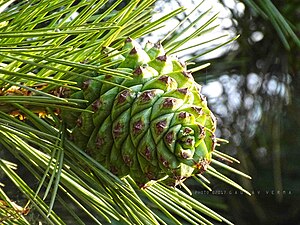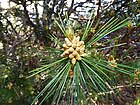Note: This is a project under development. The articles on this wiki are just being initiated and broadly incomplete. You can Help creating new pages.
Difference between revisions of "Pinus gerardiana"
| Line 1: | Line 1: | ||
[[File:Pinus gerardiana India4.jpg |thumb|right|'''Pinus gerardiana''']] | [[File:Pinus gerardiana India4.jpg |thumb|right|'''Pinus gerardiana''']] | ||
| − | Pinus gerardiana is a pine native to the northwestern Himalayas in eastern Afghanistan, Pakistan | + | '''Pinus gerardiana''' is a pine native to the northwestern Himalayas in eastern Afghanistan, Pakistan and northwest India. it is growing at elevations between 1800 and 3350 metres. It often occurs in association with Cedrus deodara and Pinus wallichiana. |
==Uses== | ==Uses== | ||
{{Uses|Dressing of wounds}}, {{Uses|Ulcers}}. | {{Uses|Dressing of wounds}}, {{Uses|Ulcers}}. | ||
| Line 8: | Line 8: | ||
==Chemical Composition== | ==Chemical Composition== | ||
| − | It including proteins, carbohydrates, fibers, minerals besides its higher amount of oil. | + | It including proteins, carbohydrates, fibers, minerals besides its higher amount of oil.<ref name="chemical composition"/> |
| − | <ref name="chemical composition"/> | ||
==Common names== | ==Common names== | ||
| − | {{Common names|kn=|ml=|sa=|ta=|te=|hi= | + | {{Common names|kn=|ml=|sa=|ta=|te=|hi=Chilghoza|en=Chilghoza Pine, Noosa}} |
==Properties== | ==Properties== | ||
| Line 39: | Line 38: | ||
===Fruit=== | ===Fruit=== | ||
| − | {{Fruit|Simple Fruit|Ellipse|The cones are 10-18 cm long, 9-11 cm wide when open, with wrinkled, reflexed apophyses and an umbo curved inward at the base | + | {{Fruit|Simple Fruit|Ellipse|The cones are 10-18 cm long, 9-11 cm wide when open, with wrinkled, reflexed apophyses and an umbo curved inward at the base|Dark red|The seeds are 17-23 mm long and 5-7 mm broad}} |
===Other features=== | ===Other features=== | ||
| Line 50: | Line 49: | ||
==How to plant/cultivate== | ==How to plant/cultivate== | ||
| − | This plant is light well-drained sandy or gravelly loam. Dislikes poorly drained moorland soils. Established plants tolerate drought. Found on clay soils in the wild. | + | This plant is light well-drained sandy or gravelly loam. Dislikes poorly drained moorland soils. Established plants tolerate drought. Found on clay soils in the wild.<ref name="How to plant/cultivate"/> |
| − | <ref name="How to plant/cultivate"/> | ||
==Commonly seen growing in areas== | ==Commonly seen growing in areas== | ||
| Line 74: | Line 72: | ||
==External Links== | ==External Links== | ||
| − | * [http://www.uniindia.com/challenge-to-save-chilgoza-wild-mushrooms-in-hp/states/news/1268329.html Pinus | + | * [http://www.uniindia.com/challenge-to-save-chilgoza-wild-mushrooms-in-hp/states/news/1268329.html Pinus gerardian on uniindia.com] |
[[Category:Herbs]] | [[Category:Herbs]] | ||
[[Category:Pinaceae]] | [[Category:Pinaceae]] | ||
Latest revision as of 14:49, 2 July 2020
Pinus gerardiana is a pine native to the northwestern Himalayas in eastern Afghanistan, Pakistan and northwest India. it is growing at elevations between 1800 and 3350 metres. It often occurs in association with Cedrus deodara and Pinus wallichiana.
Contents
- 1 Uses
- 2 Parts Used
- 3 Chemical Composition
- 4 Common names
- 5 Properties
- 6 Habit
- 7 Identification
- 8 List of Ayurvedic medicine in which the herb is used
- 9 Where to get the saplings
- 10 Mode of Propagation
- 11 How to plant/cultivate
- 12 Commonly seen growing in areas
- 13 Photo Gallery
- 14 References
- 15 External Links
Uses
Parts Used
Chemical Composition
It including proteins, carbohydrates, fibers, minerals besides its higher amount of oil.[1]
Common names
| Language | Common name |
|---|---|
| Kannada | |
| Hindi | Chilghoza |
| Malayalam | |
| Tamil | |
| Telugu | |
| Marathi | NA |
| Gujarathi | NA |
| Punjabi | NA |
| Kashmiri | NA |
| Sanskrit | |
| English | Chilghoza Pine, Noosa |
Properties
Reference: Dravya - Substance, Rasa - Taste, Guna - Qualities, Veerya - Potency, Vipaka - Post-digesion effect, Karma - Pharmacological activity, Prabhava - Therepeutics.
Dravya
Rasa
Guna
Veerya
Vipaka
Karma
Prabhava
Habit
Identification
Leaf
| Kind | Shape | Feature |
|---|---|---|
| Simple | Linear | 6-10 cm long, spreading stiffly, glossy green |
Fruit
| Type | Size | Mass | Appearance | Seeds | More information |
|---|---|---|---|---|---|
| Simple Fruit | Ellipse | The cones are 10-18 cm long, 9-11 cm wide when open, with wrinkled, reflexed apophyses and an umbo curved inward at the base | Dark red | The seeds are 17-23 mm long and 5-7 mm broad | {{{6}}} |
Other features
List of Ayurvedic medicine in which the herb is used
Where to get the saplings
Mode of Propagation
How to plant/cultivate
This plant is light well-drained sandy or gravelly loam. Dislikes poorly drained moorland soils. Established plants tolerate drought. Found on clay soils in the wild.[3]
Commonly seen growing in areas
Photo Gallery
References
External Links
- Ayurvedic Herbs known to be helpful to treat Dressing of wounds
- Ayurvedic Herbs known to be helpful to treat Ulcers
- Herbs with Fruits used in medicine
- Herbs with common name in Hindi
- Herbs with common name in English
- Habit - Tree
- Index of Plants which can be propagated by Seeds
- Herbs that are commonly seen in the region of Evergreen area
- Herbs
- Pinaceae



